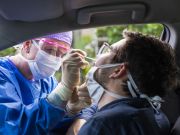
As the daily U.S. coronavirus death toll averaged more than 1,000 for the ninth straight day on Tuesday, governors from seven states banded together to shorten turnaround time for COVID-19 test results.
Three Republican governors and three Democratic governors signed an interstate testing agreement on Tuesday, The New York Times reported. Louisiana, Maryland, Massachusetts, Michigan, Ohio and Virginia will work with the Rockefeller Foundation and two U.S. manufacturers of rapid tests to buy 3 million tests, the newspaper said.
A seventh state, North Carolina, later joined the pact, CNN reported.
The bipartisan plan illustrates just how bad testing delays are across the country.
The United States is testing about 755,000 people a day, up from about 640,000 per day a month ago, the Times reported. But with testing chemicals and other equipment in short supply, and a surge in coronavirus cases nationwide, many Americans are still having to wait many days for results, the Post reported.
Most people who are tested do not receive results within the 24 to 48 hours recommended by public health experts to slow the virus’s spread and quickly conduct contact tracing, according to a new survey by researchers from Harvard University, Northeastern University, Northwestern University and Rutgers University, the Times reported.
People who had been tested for the virus in July reported an average wait time of about four days, the survey of 19,000 Americans found. Overall, about 10 percent of people reported waiting 10 days or more.
“Testing is just not quick enough,” Matthew Baum, a professor of public policy at Harvard University, told the Times. “This is an enormously widespread problem.”
Another public health expert agreed.
“A test result that comes back in seven or eight days is worthless for everybody — it shouldn’t even be counted,” said Dr. Amesh Adalja, a senior scholar at the Johns Hopkins University Center for Health Security in Baltimore. “It’s not a test in any kind of effective manner because it’s not actionable.”
Final stage vaccine trials underway
On the vaccine front, the final phases of testing for two potential COVID-19 vaccines have been launched.
In one trial, the first of 30,000 volunteers will be given either a vaccine developed by Moderna Inc. and the U.S. National Institutes of Health or a placebo shot, the Post reported.
Pharmaceutical giant Pfizer has also announced that it was starting a 30,000-person final phase vaccine trial, to be conducted at 120 sites globally.
Fauci predicted that researchers would probably be able to tell whether the Moderna vaccine was effective by November or December, although he added that it was a “distinct possibility” an answer could come sooner. Pfizer officials have said the company expects to be able to seek regulatory authorization or approval for its vaccine by October, the Post reported.
As cases have surged and testing delays have followed, contact tracing is becoming irrelevant in many parts of the country.
In many cities in Florida, a state which has seen soaring cases counts in the past month, officials have largely given up on tracking cases, and the situation is equally grim in California, the Times reported.
“I think it’s easy to say contact tracing is broken,” Carolyn Cannuscio, an expert on the strategy and an associate professor of family medicine and community health at the University of Pennsylvania, told the Times. “It is broken because so many parts of our prevention system are broken.”
By Wednesday, the U.S. coronavirus case count passed 4.7 million as the death toll passed 157,000, according to a Times tally.
According to the same tally, the top five states in coronavirus cases as of Wednesday were: California with over 527,000; Florida with more than 497,000; Texas with over 471,000, New York with over 422,000, and New Jersey with more than 184,800.
Nations grapple with pandemic
Elsewhere in the world, the situation remains challenging.
In Australia, the premier of Victoria has declared a “state of disaster,” announcing even stricter lockdown measures, including a nightly curfew and banning virtually all trips outdoors.
“We have to do more, and we have to do more right now,” said Premier Daniel Andrews. “Where you slept last night is where you’ll need to stay for the next six weeks.”
Things continue to worsen in India. On Wednesday, the country passed 1.9 million infections and nearly 40,000 deaths, a Johns Hopkins tally showed. The surge comes weeks after a national lockdown was lifted, and it’s prompted some parts of the country to revert back to stricter social distancing measures. Only the United States and Brazil have higher caseloads.
Brazil is also a hotspot in the coronavirus pandemic, with over 2.8 million confirmed infections by Wednesday, according to the Hopkins tally. It has the second-highest number of cases, behind only the United States.
Cases are also spiking wildly in Russia: As of Wednesday, that country reported the world’s fourth-highest number of COVID-19 cases, at nearly 865,000, the Hopkins tally showed.
Worldwide, the number of reported infections passed 18.5 million on Wednesday, with over 700,000 deaths, according to the Hopkins tally.
More information
The U.S. Centers for Disease Control and Prevention has more on the new coronavirus.
Source: HealthDay
Copyright © 2024 HealthDay. All rights reserved.

Leave a Reply